#5: The Blob by the Five Blobs
City: Guelph, ON
Radio Station: CJOY
Peak Month: November 1958
Peak Position in Guelph ~ #3
Peak position in Vancouver ~ #40
Peak Position on Billboard Hot 100 ~ #35
YouTube: “The Blob”
Lyrics: “The Blob”
This “Artists’ Biography for Jockey Programming” was released by Columbia Records.
All Five Blobs Are Bernie Nee
Columbia’s Five Blobs are, one and all, Bernie Nee, an ex-Seabee who got his first taste of show business leading a band o Saipan. When he was discharged from the service in 1946, the Bronc lad re-entered New York University, switching his major from dentistry to music. He was fortunate enough to receive encouragement from his family. Upon graduation in 1948, Nee began playing guitar and bass with small groups at dances and weddings in and around New York. Then in 1951, he began to make demonstration records for song writers. During the same year he also made 30 children’s records, and sang radio and TV commercials with the Goldswan Singers. The tall, brown-haired singer is 32, married, and the father of three children.”
Bernie Knee was born in New York City in 1924. However, the recording industry spelled his name Bernie Nee for most of his recordings. He served in the U.S. Navy in World War II. The clubs in New York City Bernie Nee performed in include the Copacabana, the Riverboat, and Michael’s Pub. Nee made more than 5,000 demo recordings for songwriters in many genres.
In December 1955, Nee provided lead vocals on “Hey, Pretty Girl”, a rock ‘n roll tune by Sammy Kaye. Bandleader Kaye hired Sam “The Man” Taylor to add saxophone to the rocking tune. It was a local hit in New York, and a Top Ten hit in February ’56 in Palm Beach (FL) and Stockton (CA). In early 1956, billed as Bernie Knee he released “City Boy”, which was a Top Ten hit in Cambridge (MA).
In early 1957, billed as Bernie Nee, Columbia released “Follow Me” which made the Top Ten in Salt Lake City. A followup release, “I Have You To Thanks”, was a Top 50 hit in Vancouver (BC) in March ’57. In the spring of 1957, Bernie Nee was lead vocalist on “Hey Liley, Liley Lo”.
In early 1958, Bernie Nee had a number-one hit in New Orleans with “Lend Me Your Comb”. It also climbed to #8 in Toronto. Billboard Magazine reviewed Bernie Nee’s version of “Lend Me Your Comb” in their December 30, 1957, issue. Of “Bernie Nee – Lend Me Your Comb” the magazine staff wrote, “cover of the Carol Hughes will offer strong competition to the original. Fine vocal effort by the artist and good backing have a sound that could click with the kids.”
Bernie Knee was back in the recording studio to in advance of the September 1958 release of a new Paramount Pictures movie called The Blob. He provided all the vocals for The Five Blobs Columbia Records release of “The Blob”. The 45 RPM states “The Blob” (From the Paramount Picture “The Blob”).
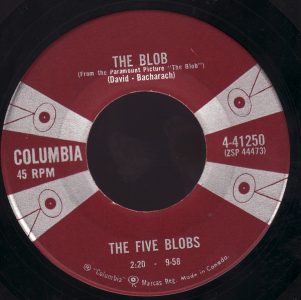
Bernie Nee’s voice was overdubbed. He sang “The Blob” and had studio musicians backing him to form the Five Blobs for Paramount Pictures release of the horror film The Blob. The film concerned an alien amoeboid – a unicellular organism with the ability to alter its shape, primarily by extending and retracting pseudopods. The Blob crashed to Earth from outer space inside a meteorite, landing near the small communities of Phoenixville and Downington, Pennsylvania – about 30 miles west of Philadelphia. The Blob envelops living beings, growing larger, becoming redder in color and more aggressive, eventually becoming larger than a building.
Posters for the movie announced “Indescribable… Indescructible! Nothing Can Stop It! The Blob”
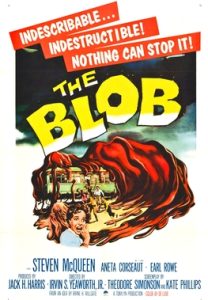
In a small Pennsylvania town, teenager Steve Andrews (Steve McQueen) and his girlfriend Jane Martin (Aneta Corseaut) kiss at a lover’s lane when they see a meteorite crash beyond the next hill. Steve goes looking for it but Barney, an old man living nearby, finds it first. When he pokes the meteorite with a stick, it breaks open and a small jelly-like globule blob inside attaches itself to his hand. In pain and unable to scrape or shake it loose, Barney runs onto the road, where he is nearly struck by Steve’s car. Steve and Jane take him to Doctor Hallen.
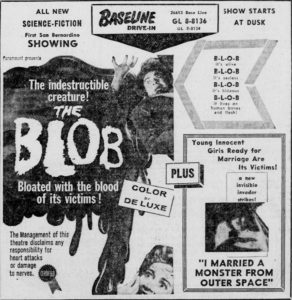
Drive-in theater poster for The Blob
Doctor Hallen anesthetizes the man and sends Steve and Jane back to locate the impact site and gather information. Hallen decides he must amputate the man’s arm since it is being phagocytosed. Before he can, the Blob completely absorbs Barney, then Hallen’s nurse Kate, and finally the doctor himself, growing redder and larger with each victim. Steve and Jane return in time for Steve to witness the doctor trying to escape through the window with the Blob covering him. They go to the police station and return with Lieutenant Dave Barton and Sergeant Jim Bert, but they find no sign of the Blob nor its victims. The skeptical Bert dismisses Steve’s story as a prank. Steve and Jane are taken home by their parents, but they sneak out later.
The Blob absorbs a mechanic at a repair shop. During a midnight screening of Daughter of Horror at the Colonial Theater, Steve recruits Tony and his friends to warn people about the Blob. The Blob enters the Colonial Theater and envelops the projectionist, then oozes into the auditorium. Steve is finally vindicated when screaming people flee the theater in panic.
Steve learns that The Blob is vulnerable to cold and eventually is able with help to freeze the alien. U.S. Air Force cargo aircraft airlift The Blob to the Arctic to keep it from doing any more harm.
Burt Bacharach and Mack David wrote lyrics for “The Blob”. The song begins “Beware of The Blob” and describes how
...it creeps, and leaps, and glides and slides across the floor,
and right through the door, and all around the wall, a splotch, a blotch,
Beware of The Blob.
Burt Bacharach was part of a songwriting team with Mack David’s brother, Hal David. Burt Bacharach was born in Kansas City, Missouri, in 1928. He studied at McGill in Montreal, and music schools in New York City and California. In 1948 he was drafted into the United States Army. While in West Germany he met singer Vic Damone, and when he was discharged Burt Bacharach worked with Damone for three years.
Bacharach was in several successful songwriting teams, including with Bob Hillier. They co-wrote “Any Day Now (My Wild Beautiful Bird)” for Chuck Jackson, “Tower Of Strength” for Gene McDaniels,
Burt Bacharach and Hal David were composers working in the Brill Building starting in the late 50s. They co-wrote “The Story Of My Life” which became a #1 hit for Michael Holliday in 1958 in the UK, and “Magic Moments” for Perry Como another #1 hit in the UK and #4 on the Billboard Hot 100 later that year. In 1961 Bacharach wrote “Tower Of Strength” for Gene McDaniels and “Baby It’s You” for The Shirelles. Bacharach and David had a banner year in 1962 with hits that included “(The Man Who Shot) Liberty Valance” (Gene Pitney), “Make It Easy On Yourself” (Jerry Butler), “Don’t Make Me Over” (Dionne Warwick) and “Only Love Can Break A Heart” (Gene Pitney). In 1963 the songwriting team enjoyed more accolades with “Wishing And Hoping” (Dusty Springfield), “Blue On Blue” (Bobby Vinton), “(They Long To Be) Close To You” (The Carpenters, #1 in 1970) and “Anyone Who Had A Heart” (Dionne Warwick). 1964 continued Buurt Bacharach and Hal David’s winning ways with “Walk On By” (Dionne Warwick) and “There’s Always Something There To Remind Me” (Sandie Shaw, #1 UK).
In 1965, Bacharach and Hal David were nominated for an Academy Award in the Best Song category for “What’s New Pussycat?”. They received nominations again in 1966 for “Alfie” and in 1967 for “The Look of Love”. In 1969, Bacharach and Hal David won Academy Awards for “Raindrops Keep Falling On My Head” (BJ Thomas, #1 US) in the Best Song category, and Best Score for an Original Motion Picture with Butch Cassidy and the Sundance Kid. In 1970, Bacharach and David won a Grammy Award for Best Score from an Original Caste Album for Promises, Promises. In 1981, Burt Bacharach shared an Academy Award for Best Original Song with “Arthur’s Theme (Best That You Can Do)”. Over the years, Burt Bacharach received six Academy Award nominations and won three of these. He also received seven Golden Globe nominations and won two of these.
At the Grammy Awards, Burt Bacharach shared award nominations with Hal David for “Wives and Lovers” (1963), “What the World Needs Now Is Love” (1965), “Casino Royale” (1967). They won a Grammy in 1967 for “Alfie” in the Best Instrumental Arrangement category. The songwriting duo also received Grammy nominations for both “I’ll Never Fall In Love Again” and “Raindrops Keep Falling On My Head” (both losing out to “Games People Play” by Joe South).
In 1981, Bacharach received a Grammy nomination for “Arthur’s Theme”. In 1986 he shared the Grammy Award for Record of the Year in 1986 for “That’s What Friends Are For” with Carol Bayer Sager. In 1995, he shared a Grammy nomination with Elvis Costello in the Best Pop Collaboration with Vocals category for “God Give Me Strength”. Bacharach and Costello won in that category in 1998 for “I Still Have That Other Girl”.
In 2005, Burt Bacharach won a Grammy Award for At This Time in the Best Contemporary Instrumental Album category. In addition, he received a second Grammy nomination for the track “In This Time”.
In 2020, Burt Bacharach received a Grammy nomination in the Best Traditional Pop Vocal Album category for Blue Umbrella. In 2021, Burt Bacharach received a Grammy nomination for Burt Bacharach and Steven Sater’s Some Lovers in the Best Musical Theatre Album category. Over the decades Burt Bacharach received 22 Grammy Award nominations, winning on six occasions.
Over the years Burt Bacharach wrote the soundtracks to eleven movies, and seven theatrical works. He also released eight solo albums, among his many accomplishments. Burt Bacharach died in 2023 at the age of 94.
Mack David was born in 1912 to a Jewish family in New York City. He planned a career in law, but switched to songwriting as he tunes got attention. In 1935, Mack David had a Top 20 hit with “Quicker Than You Can Say Jack Robinson” for Ozzie Nelson and his Orchestra. In 1939, “Sixty Seconds Got Together” was a Top Ten hit for the Mills Brothers. That same year Glenn Miller had a number-one hit with Mack David’s “Moon Love” (which was also at Top Ten hit for several other recording artists).
Mack David’s other notable songs that went on to become hits include “On The Isle of May” (#3 for Connie Boswell in 1940), “The Singing Hills” (#2 for Bing Crosby in 1940), “Take Me” (#5 for Jimmy Dorsey in 1942), “Johnny Zero” (#7 for the Songs Spinners in 1943), “It’s Love-Love-Love Baby” (#1 in 1944 for Guy Lombardo and his Royal Canadians), “Candy” (a number-one hit for Johnny Mercer and Jo Stafford in 1945), “Chi-Baba, Chi-Baba” (number-one for Perry Como in 1946), “Sunflower” (#5 for Russ Morgan in 1949), “Bibbidi-Bobbidi-Boo” (a Top 2o hit for both the Fontane Sisters and Jo Stafford in 1950), “I Don’t Care If the Sun Don’t Shine” (a #8 hit for Patti Page in 1950), “Cherry Pink and Apple Blossom White” (a number-one hit for Perez Prado in 1955), “Bimbombey” (#11 for Jimmy Rodgers in 1958), “Young Emotions” (#12 for Ricky Nelson in 1960), “Baby It’s You” (#8 in 1961 for The Shirelles, and #5 for Smith in 1969), “Hush Hush Sweet Charlotte” (#8 in 1965 for Patti Page), and “It Must Be Him” (#3 in 1967 for Vicki Carr). In 1950, he also wrote the theme song to the cartoon Casper the Friendly Ghost (which was featured in individual cartoon episodes before it got its own TV show beginning in 1959).
David’s most remunerative song was “Sunflower” recorded by Frank Sinatra in 1948. Jerry Herman used four bars from the song for his theme song in the hit musical Hello Dolly! When David sued Herman for copyright infringement, he won $250,000 in an out-of-court settlement. Mack David died on New Year’s Day in 1994 at the age of 81.
“The Blob” peaked at #3 in Guelph (ON), #4 in Albany (NY), #5 in Memphis (TN), Arlington (VA), and Baltimore, #9 in Burlington (VT), Salt Lake City, and Bakersfield (CA), #10 in Denver, and Lexington (KY), #12 in Toronto, #15 in Duluth (MN), and #40 in Vancouver. “The Blob” also charted in Chicago, Hammond (IN), Las Vegas, Philadelphia, San Francisco, and Seattle.
The B-side for The Five Blobs, “Saturday Night in Tiajuana”, reached the Top Ten in Bakersfield (CA).
Bernie Nee was not listed on any of the promotional materials for the film or the record. To protest this oversight, Nee bought advertisements in music industry trade publications, showcasing his name, whereupon he was terminated from Columbia Records.
Nee signed with Joy Records and with the label The Five Blobs released “From The Top Of Your Guggle (To The Bottom Of Your Zooch)” which charted in Baltimore in January 1959. Next, The Five Blobs released “Juliet” later in 1959. Bernie Knee also released “The Hully Gully” (with different lyrics from the Olympics) backed by the Irving Fields Orchestra. However, the Knee’s Holly Gully was not a hit.
In the winter of 1960-61, Bernie Knee recorded a demo with Carole King titled “That’s What I Call True Love” which was recorded in 1961 by Carl Dobbins Jr. and charted in Vancouver (BC). Knee and King also recorded several more demos, including “Sixteen Cubes of Sugar” which was recorded by Brian Hyland. In 1995 Brill Tone Records release an album titled The Right Girl: Brill Building Legends Complete Recordings 1958 to 1966. The double album contained 57 tracks and was released in Germany. It includes three demos recorded by Carole King and Bernie Knee.
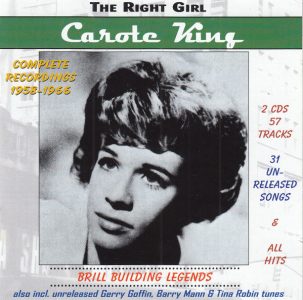
Bernie Nee wrote numbers of songs into the 1970s. One of these, “The Car Hop And The Hard Top” was recorded in 1963 by Marcy Jo with Eddie Rambeau. That year he made a demo recording of “Put On Your Sunday Clothes” for the Broadway musical Hello Dolly!. In 1965, he recorded “The Holiday Hop” aspiring to end up with a seasonal hit single over the Christmas holidays. It wasn’t a hit.
In 1974, Bernie Knee released “Hang in There Mr. President”, as part of an effort to get the public on side to oppose impeachment efforts aimed at President Richard Nixon.
Knee provided vocals on two volumes of Broadway First Take. The albums featured Burt Bacharach on piano, with selections from Hello Dolly!, Gigi, How to Succeed in Business Without Really Trying, Promises Promises, Flower Drum Song, and La Cage Aux Folles. In 1978, Bernie Knee was cast in Ballroom which was nominated for eight Tony Awards, winning in the Best Choreography category in 1979. Knee also provided backing vocals on Frank Sinatra’s Trilogy album which was released in 1980.
In 1979, Bernie Knee relocated to Florida. In 1982, Bernie played guitar on his self-titled Bernie Knee album. The album featured Knee singing classic pop tuned including “September In The Rain”, “You’re Driving Me Crazy” and “Sweet Georgia Brown”. Knee died of cancer in 1994, at the age of 70.
October 31, 2024
Ray McGinnis
References:
Trailer, “The Blob,” Paramount Pictures, 1958.
Sammy Kaye, “Hey, Pretty Girl“, Columbia Records, 1955.
Bernie Knee, “City Boy“, Mars Records, 1956.
Marcy Jo and Eddie Rambeau, “The Car Hop And The Hard Top“, Swan Records, 1963.
Bernie Knee, “Put On Your Sunday Clothes“, RCA Victor, 1963.
Bernie Knee, “Hang In There Mr. President“, Telemark Records, 1974.
Carole King and Bernie Knee, “That’s What I Call True Love“, Decca Records, 1961.
Bernie Knee, “The Holiday Hop“, Pat Records, 1965.
Carole King The Right Girl: Brill Building Legends – Complete Recordings 1958-1966, Brill Tone Records, Germany, 1995. (Also included unreleased Gerry Goffin, Barry Mann and Tina Robin tunes).
Richard Barber, “Burt Bacharach at 88: ‘Why Would I Ever Want To Stop?’,” Telegraph, June 10, 2016.
Lauren Huff, “Dionne Warwick says loss of Burt Bacharach is ‘like losing a family member’,” Entertainment Weekly, February 9, 2023.
“Mack David, 81, A Composer and Lyricist,” New York Times, January 1, 1994.
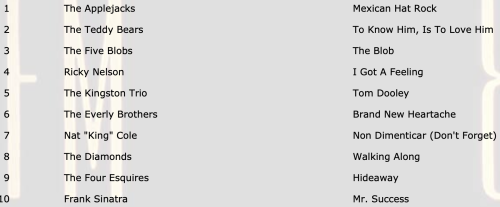
CJOY 1460-AM Guelph (ON) Top Ten | November 15, 1958

When The Blob came out, the lead actor was referred to as Steven McQueen. As to Bacharach & David, you got to stop somewhere. “The Story Of My Life” by Marty Robbins is my number one go-to record.